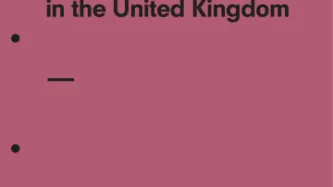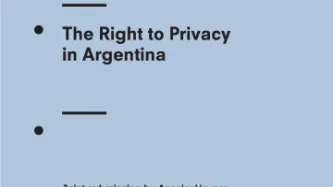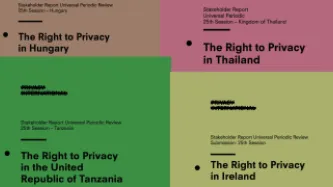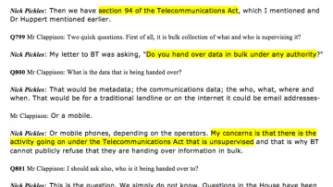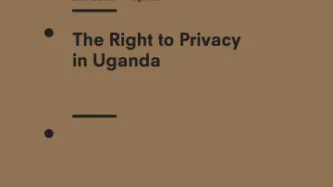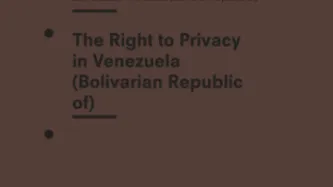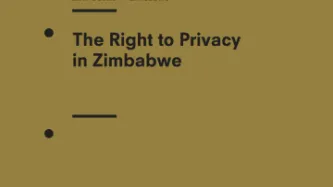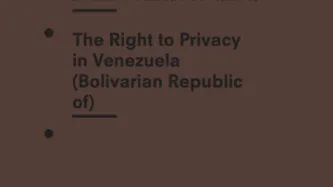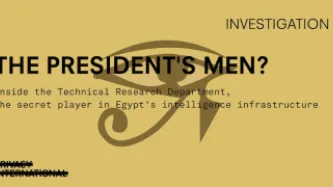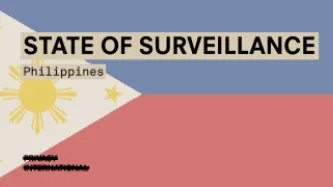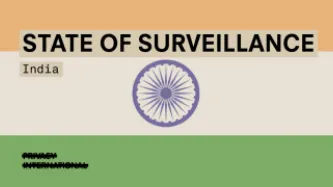Search
Content type: Advocacy
This stakeholder report is a submission by Privacy International (PI) and the IT-Political Association of Denmark. PI is a human rights organisation that works to advance and promote the right to privacy and fight surveillance around the world. PI wishes to bring concerns about the protection and promotion of the right to privacy in Denmark before the Human Rights Council for consideration in Denmark's upcoming Universal Periodic Review.
Content type: Press release
Previously secret official documents, containing new revelations about the Government's mass surveillance regime, have today been disclosed as a result of litigation brought by Privacy International against the Intelligence Agencies (MI5, MI6, GCHQ). These documents shed further light on the secretive bulk data collection regime operating under section 94 of the Telecommunications Act 1984 and the Bulk Personal Data-set regime.
Documents available:…
Content type: Press release
Tomorrow, on 26 July, the main hearing will begin in Privacy International's legal challenge against MI6, MI5, and GCHQ's collection of bulk communications data and bulk personal datasets. Previously secret documents will be made public at the hearing, and Privacy International will brief attending journalists about the significance of the disclosed documents.
The hearing will include references to important documents detailing the collection of data on every citizen in the…
Content type: Advocacy
This stakeholder report is a submission by Privacy International (PI). PI is a human rights organisation that works to advance and promote the right to privacy and fight surveillance around the world. PI wishes to bring concerns about the protection and promotion of the right to privacy in the United Kingdom before the Human Rights Committee for consideration in the United Kingdom's upcoming review.
Content type: Press release
This week in Geneva, the UN Human Rights Committee will examine the Argentina’s compliance with the International Covenant on Civil and Political Rights (ICCPR), an international treaty which places obligations on signatories to guarantee human rights such as the right to privacy.
This review, by a body of independent experts charged with monitoring compliance with the ICCPR, comes at a critical time for Argentina laws and policies on privacy and surveillance.
Recent years have seen…
Content type: Press release
Esta semana en Ginebra, el Comité de Derechos Humanos de la ONU examinará el cumplimiento de la Argentina con el Pacto Internacional de Derechos Civiles y Políticos (PIDCP), un tratado internacional que establece obligaciones a los firmantes para garantizar los derechos humanos, como el derecho a la privacidad.
Este examen, por un grupo de expertos independientes encargados de vigilar el cumplimiento del PIDCP, llega en un momento crítico para las leyes y políticas de la Argentina sobre la…
Content type: Advocacy
La Asociación por los Derechos Civiles (ADC) y Privacy International toman nota de las respuestas del gobierno de Argentina a la lista de cuestiones antes de la presentación del informe, en particular en relación a la legislación, políticas y prácticas relacionadas con la vigilancia y la protección de los datos personales.
Privacy International es una organización de derechos humanos que trabaja para favorecer y promover el derecho a la privacidad y la lucha contra la vigilancia en todo el…
Content type: Advocacy
Asociación por los Derechos Civiles (ADC) and Privacy International note the replies by the government of Argentina to the list of issues prior to the submission of the report, in particular in relation to the laws, policies and practices related to surveillance and protection of personal data.
Privacy International is a human rights organisation that works to advance and promote the right to privacy and fight surveillance around the world. The Asociación por los Derechos Civiles (ADC) is a…
Content type: Advocacy
La Asociación por los Derechos Civiles (ADC) y Privacy International toman nota de las respuestas del gobierno de Argentina a la lista de cuestiones antes de la presentación del informe, en particular en relación a la legislación, políticas y prácticas relacionadas con la vigilancia y la protección de los datos personales.
Privacy International es una organización de derechos humanos que trabaja para favorecer y promover el derecho a la privacidad y la lucha contra la vigilancia en todo el…
Content type: Press release
Harmit Kambo, Campaigns Director, Privacy International said
"The overwhelming vote by MPs last night in favour of massively intrusive new state surveillance powers represents both a failure of the democratic process and a grim watershed moment for the privacy of every one of us.
Over the course of the Bill Committee stage, Privacy International, alongside experts from academia, technology firms, the legal profession, human rights organisations, and civil liberties groups have proposed over…
Content type: Press release
Privacy International releases previously confidential correspondence between lawyers for MI5 and GCHQ and the former Interception of Communications Commissioner, highlighting problems with the relationship between the two bodies
The correspondences show a lack of meaningful oversight and restraint of UK surveillance agencies
Ahead of the vital commons vote on the Investigatory Powers Bill, we need to create a system that guarantees better oversight of surveillance powers…
Content type: News & Analysis
Another committee-led scrutiny. Another list of changes that need to be made to the Investigatory Powers Bill. This seems familiar.
The Joint Committee on Human Rights has weighed in with scrutiny of the Investigatory Powers Bill prior to the Bill’s debate and vote in the House of Commons on the 6 and 7 June. The recommendations the report contains once again raise questions about the fitness of the Bill to be passed in its current form.
The Committee identified thematic warrants - which…
Content type: News & Analysis
Thank you to those of you who joined our campaign, 'Did GCHQ Illegally Spy on You?'. If you made a claim to the Investigatory Powers Tribunal (IPT) - the court that hears claims about surveillance by public bodies, including the intelligence agencies - to find out if GCHQ has illegally obtained your communications, you will have probably received a letter or email from the IPT by now. We've written a 'Frequently Asked Questions' (FAQ) to help clarify what the ruling means and how you can now…
Content type: Press release
Despite Government attempts to stop 650 claims about surveillance being investigated, the Investigatory Powers Tribunal has today ruled that the cases can be heard
However, the Tribunal is requiring the 650 claimants to submit further information demonstrating that they are "potentially at risk" of unlawful surveillance, prior to investigating their claims of unlawful spying
The Tribunal has said that people outside the UK have no legal right to find out if British…
Content type: News & Analysis
This letter originally appeared here.
Dear Home Secretary
You are fortunate that the SNP and Labour Party courageously abstained from the vote on the Investigatory Powers Bill, content with government assurances that mass surveillance of British citizens is not government policy. Mass surveillance is not, and could never be, government policy. Merely government practice.
I congratulate you on your much-quoted claim that the Investigatory Powers Bill will contain a “world-leading…
Content type: News & Analysis
“It’s like 10,000 spoons when all you need is a knife”. Alanis Morissette thought that was ironic. I never thought so. I suggest a far more ironic lyric to you Alanis - "It’s like the Home Office not listening during a consultation about how it wants to listen to everything you do’. OK, it might not be the catchiest lyric, but you can’t say it’s not ironic.
Today the latest version of the Investigatory Powers Bill was published. The Government might want some credit…
Content type: News & Analysis
Over the next two weeks, the 25th session of the Universal Period Review Working Group will take place in Geneva. The Universal Period Review is a key mechanism of the UN Human Rights Council to remind UN Member States of their responsibility to respect and implement all human rights and fundamental freedoms.
Amongst others, Hungary, the United Republic of Tanzania, Thailand, and Ireland will be reviewed. Privacy International, in collaboration with national civil society…
Content type: Long Read
1984: A broad law, a broad power and a whole lot of secrecy
In the wake of litigation brought by Privacy International (‘PI’) and as the Government prepared to introduce the Draft Investigatory Powers Bill (‘IP Bill’) in November 2015, there was a cascade of ‘avowals’- admissions that the intelligence agencies carry out some highly intrusive surveillance operations under powers contained in outdated and confusing legislation.
It is disappointing that it has been almost six months since…
Content type: Press release
Previously confidential documents published today reveal the staggering extent of UK Government surveillance that has been kept secret from the public and Parliament for the last 15 years. Revealed in a case brought by Privacy International about the use of so-called 'Bulk Personal Datasets' and a law dating back to 1984, the extracts show that the UK Government's intelligence services, GCHQ, MI5, and MI6, routinely requisition personal data from potentially thousands of public and…
Content type: News & Analysis
This week the Mexican Supreme Court will issue its judgement on the country’s data retention. It will decide on an injunction against the provisions of the the Federal Telecommunications Act known as the ‘Ley Telecom’. The Act requires all telephone companies and internet service providers to retain user communications data for a period of 24 months.
Following the failure of the National Human Rights Commission (CNDH) and the Federal Institute for Access to Public Information and Data…
Content type: Long Read
Written by: Maria del Pilar Saenz
With a raft of recent scandals involving proven and possible abuses of surveillance systems by state institutions, there is a clear need to generate policy and practice in Colombia that promotes respect for human rights. It is necessary to keep this in mind as an emerging public policy discussion on cybersecurity led by CONPES (The National Council for Economic and Social Policy) begins in Colombia. This series of reforms will serve as the policy basis…
Content type: Advocacy
This stakeholder report is a submission by Privacy International (PI), Unwanted Witness Uganda, the Collaboration on International ICT Policy for East and Southern Africa (CIPESA) and the East and Horn of Africa Human Rights Defenders Project (EHAHRDP).
Content type: Advocacy
This Universal Periodic Review (UPR) stakeholder report is a submission by Privacy International (PI), theInternational Human Rights Clinic at Harvard Law School (IHRC), and Acceso Libre.
Content type: Advocacy
This Universal Periodic Review (UPR) stakeholder report is a submission by Privacy International (PI), the International Human Rights Clinic at Harvard Law School (IHRC), the Zimbabwe Human Rights NGO Forum(the Forum), and the Digital Society of Zimbabwe (DSZ).
Content type: Advocacy
This Universal Periodic Review (UPR) stakeholder report is a submission by Privacy International (PI), the International Human Rights Clinic at Harvard Law School (IHRC), and Acceso Libre.
Content type: News & Analysis
Hacking Team, an Italian surveillance company selling intrusive spyware to government authorities around the world, has had its global export license revoked by the Italian export authorities, according to a report in Il Fatto Quotidiano.
The move comes after intensive media scrutiny spurred by the hack of their internal systems last summer and revelations that they had sold surveillance technology to some of the world’s most authoritarian states.
One of the countries to which Hacking…
Content type: News & Analysis
Following the launch of our report "The President’s Men?" shedding light on the existence of the Technical Research Department, a secret unit within the Egyptian intelligence infrastructure we publish here an open letter we have sent to President Abdel Fattah el-Sisi demanding that he responds to the extremely worrying situation we describe in the report.
Your Excellency President Abdel-Fattah El-Sisi,
On Wednesday 24th February we released a new investigation about the Technical…
Content type: Long Read
This guest piece was written by Jessamine Pacis of the Foundation for Media Alternatives. It does not necessarily reflect the views or position of Privacy International.
Introduction
With a history immersed in years of colonialism and tainted by martial law, Philippine society is no stranger to surveillance. Even now, tales of past regimes tracking their citizens’ every move find their way into people’s everyday conversations. This, for the most part, has kept Filipinos…
Content type: Long Read
Written by: Centre for Internet and Society
This guest piece was written by representatives of the Centre for Internet and Society (CIS). It does not necessarily reflect the views or position of Privacy International.
Introduction
As part of the State of the Surveillance project, CIS conducted a review of surveillance law, policy, projects, and trends in India. Below we provide a snap shot of key legal provisions governing surveillance in India and touch on…
Content type: Long Read
The recent back and forth between Apple and the FBI over security measures in place to prevent unauthorised access to data has highlighted the gulf in understanding of security between technologists and law enforcement. Modern debates around security do not just involve the state and the individual, the private sector plays a very real role too. There are worrying implications for the safety and security of our devices. Today, a new company stepped in to this discussion -- though it had been…

